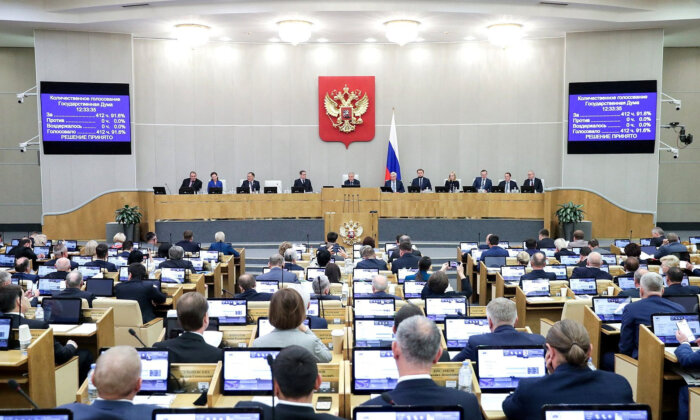Russian lawmakers vote to ban adoptions for countries allowing gender changes
They say the measure aims to shield children from potential dangers during foreign adoptions.
A bill banning the adoption of children from Russia to countries that permit gender reassignment has passed the lower chamber of Russia’s parliament. The measure now moves to the upper chamber and then to Russian President Vladimir Putin for final approval.
The State Duma, Russia’s lower chamber, approved the measure on Nov. 12 after three readings. The bill was introduced in July by legislators led by Duma Speaker Vyacheslav Volodin, who stated that over 100,000 Russian children had been adopted by foreigners in the past 30 years, and the aim of the measure is to protect children from potential dangers.
Volodin emphasized the importance of preventing any gender alterations during foreign adoptions, labeling Western policies as harmful. Co-author of the legislation, Vasily Piskarev, claimed that Russian children adopted by Western parents face risks of coerced gender changes or sexual exploitation.
The bill modifies Russia’s Family Code to prohibit the adoption of Russian children by citizens of countries that allow gender changes through medical intervention or altering identity documents to reflect a gender change without medical procedures.
Volodin listed approximately 15 countries, mainly in Europe, Australia, and Canada, that would be impacted by the law. U.S. citizens have been prohibited from adopting Russian children since 2012.
During the first reading of the measure in the State Duma on Sept. 25, Volodin emphasized that the goal was to protect childhood and traditional values.
Aside from the adoption restrictions related to gender reassignment, on Nov. 12, the State Duma also approved a bill banning material that discourages having children. This legislation would amend existing laws prohibiting the promotion of pedophilia, LGBT lifestyles, and gender reassignment.
According to Volodin, the aim is to protect citizens, especially the younger generation, from negative influences in the media that could impact personality development. The focus is on ensuring future generations grow up with traditional family values.
Last year, Russia implemented a ban on gender reassignment procedures, including sex change surgeries and changing gender markers in public records. The legislation also prohibits transgender individuals from adopting children and voids marriages if one partner changes their gender markers.
The group asserted that the restrictions are also driven by the fact that members of the LGBT community often engage in anti-war and anti-Kremlin activism.





